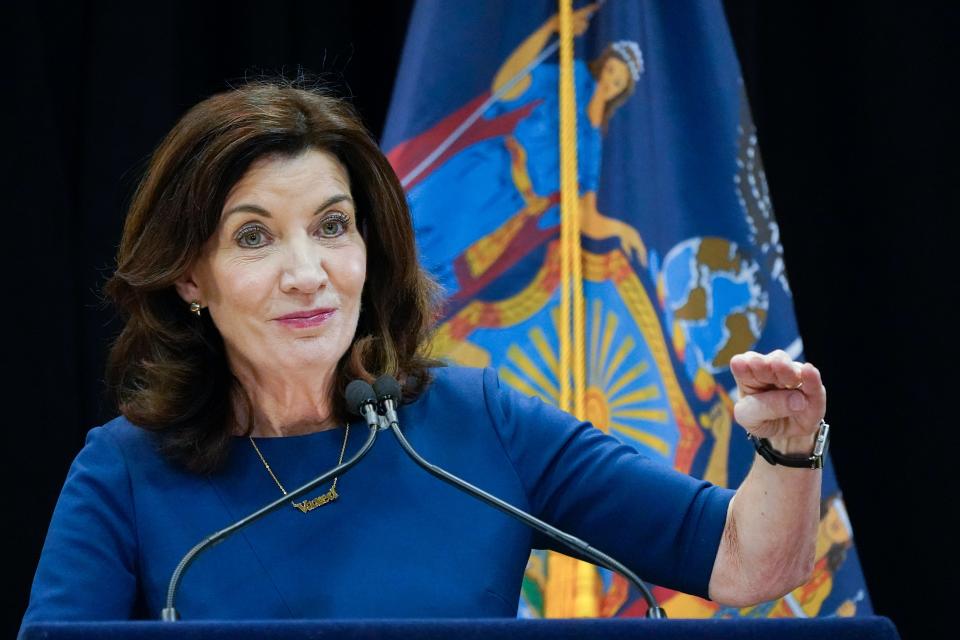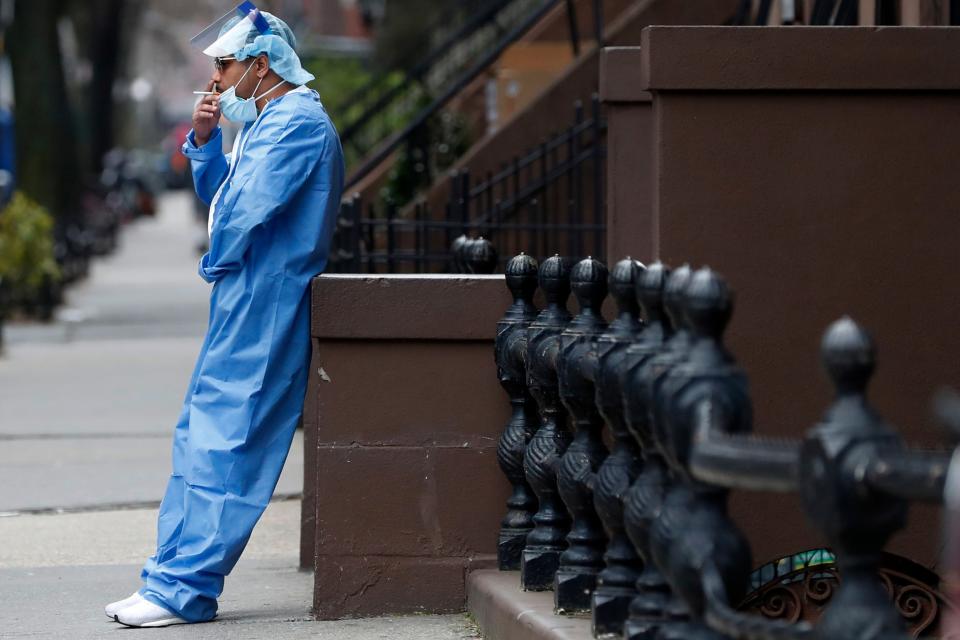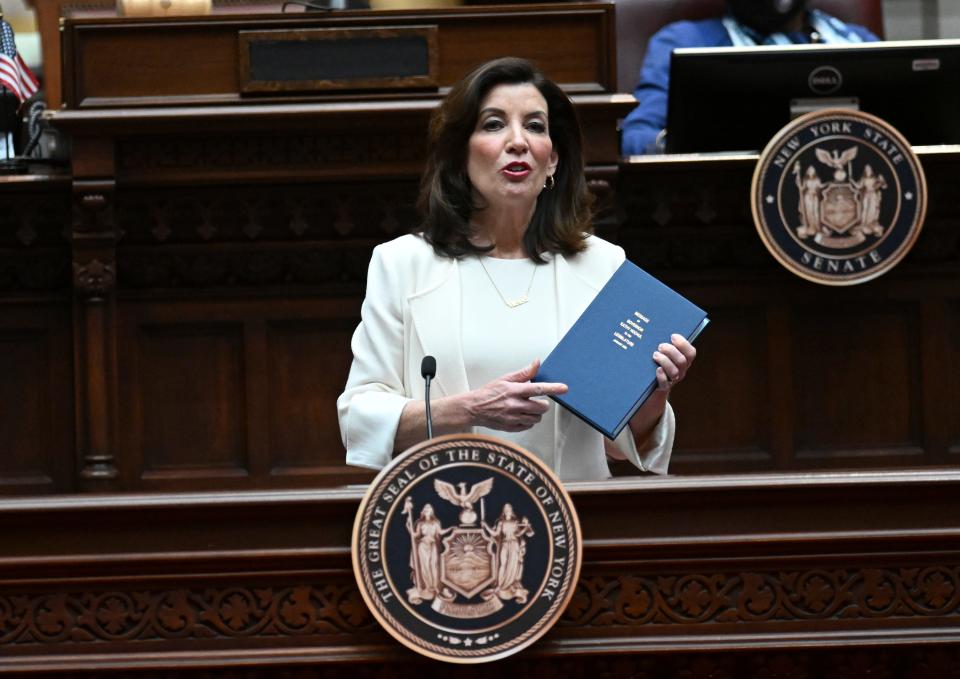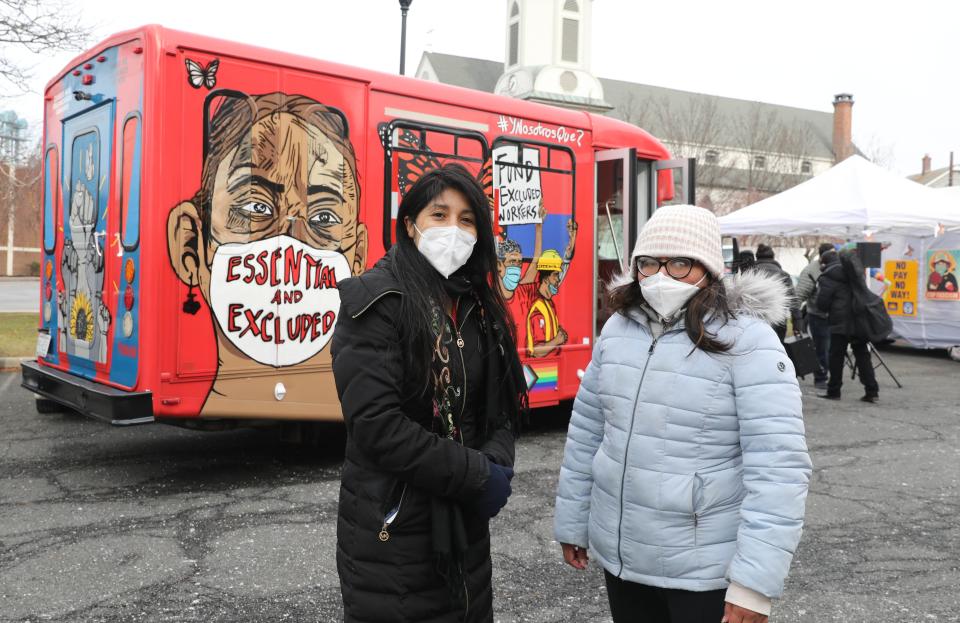Tax cuts, health care worker bonuses: 10 things to know about NY's $216B proposed budget
- Oops!Something went wrong.Please try again later.
Gov. Kathy Hochul mapped out a $216.3 billion New York state budget plan Tuesday that proposed heavy investments in rebuilding the education and health care systems while sidelining other relief programs with the hope that federal funding will resurrect them.
The state had the luxury of a financial surplus this year, thanks to a combination of better-than-expected tax revenue and economic activity, and an influx of federal funding related to the COVID-19 pandemic. The budget is $4.3 billion larger than last year.
The governor proposed to spend around $7 billion on one-time expenditures, including property tax relief and a shot in the arm for theater and the arts, which have limped along amid pandemic closures in the past two years.
"We must pass a bold agenda that will do more than just help us recover from this crisis," Hochul said in a short speech that offered few specifics about the budget expenditures. "We need to embrace this moment of possibility, and use it to redefine New York's destiny."
Hochul's negotiation of the budget process this year is key as she ramps up her campaign for governor. She'll seek election to a full term in November after taking office last August in the wake of former Gov. Andrew Cuomo's resignation amid sexual harassment allegations.
More: Hochul calls for $10B to improve health care in NY, combat staffing shortages
'We need to get back on track': Gov. Hochul addresses pretrial detention, uptick in gun violence
More: NY provides $100M to help tenants pay rent, curb homelessness amid pandemic hardships
The plan projects balanced budgets through 2027, a prospect not seen before in state government, said state budget director Robert Mujica in a budget briefing Tuesday.
Though the state is facing the highest level of inflation in 30 years and federal relief funding related to COVID-19 is beginning to wane, financial projections show a continued economic recovery, he said.
"We're in a strong financial position now," Mujica said.
Hochul’s predecessor often worked with multi-billion dollar deficits while hammering out budget deals, and warned last year that the state was facing a $15 billion deficit if the federal government didn't step in to help.
Hochul will negotiate her proposed budget plan with the State Legislature to pass a budget deal by April 1 for the fiscal year starting on July 1.
Here's what to know about Hochul's spending agenda for New York, and which items were left off the budget list.
$31 billion on education initiatives, expanding pre-K

Hochul proposed the state’s largest investment in educating the state's 2.4 million children, asking for $31 billion in school and foundation aid.
This amounts to an increase of $2.1 billion, or a 7.1% increase in funding over last year's budget.
The funding should be used to continue expanding pre-K programs and after school programs to districts across the state, she said.
“Working parents need all the support they can get,” Hochul said Tuesday.
She highlighted the need to strengthen New York’s teaching workforce and address the mental health of students fatigued and isolated by nearly two years of pandemic-related shutdowns, quarantines and remote learning.
Hochul's proposed spending "will greatly support most school districts in New York," said the Alliance for Quality Education's Executive Director Jasmine Gripper in a Tuesday statement. But Hochul also proposed to increase charter school funding in New York City, which could redirect funding away from the majority of New York City's students in district schools, Gripper said.
"In order to make sure these investments get to the majority of students in public schools, we need the legislature to reject her proposal to increase charter school tuition in New York City," Gripper said.
More: NY Gov. Hochul signs bill for $40M Early Intervention fund but sidesteps formula change
'Like winning the lottery': More 4-year-olds in pre-K thanks to bonus state grant funding
Hochul proposes $10B to rebuild health care

Hochul noted the executive budget also seeks to rebuild New York’s health care system, which she said “crumbled under the stress of the pandemic.”
The health care spending plan, paired with a goal to grow the state’s health care workforce by 20% over the next five years, consisted of $10 billion, including $1.2 billion in bonuses for front-line health care and direct-support workers earning up to $100,000 annually.
The retention and recruitment bonuses, which can be up to $3,000 per person, will be tailored in varying amounts based on hours worked, and of time in service.
Over $4 billion in funding would go to “safety net” hospitals to address pandemic-related impacts and to infrastructure upgrades at hospitals, nursing homes and other health care facilities.
The state would allocate $3.7 billion to increase the Medicaid reimbursement rate, which includes a 1% increase and restoration of the 1.5% reduction in the fiscal year 2021 budget. The spending aims in part to help providers compete in the labor market to fill staffing shortages.
Overall, some the largest chunks of the entire state budget plan involve Medicaid, the government health care program covering low- to moderate-income and disabled Americans. It is funded jointly by local, state and federal governments and currently covers more than 6.5 million New Yorkers, or one-third of the state population.
The executive budget plan calls for a roughly 10% increase in the state’s overall Medicaid spending, bringing the amount to nearly $92 billion.
That Medicaid increased includes a coverage expansion for people ages 65 and older, as well as those with disabilities. The plan would eliminate the resource eligibility test and raise the income level to 138% of the federal poverty level for these people.
More: Hochul deploying National Guard to aid short-staffed NY nursing homes. What to know
Supporting parents with over $1B for child care

Hochul's budget dials in on a topic that has bedeviled working parents during remote education: child care. The proposed spending plan includes a $1.4 billion investment in child care subsidies, which would allow for 400,000 additional children to access state funding.
The budget, she said, would "invest more in child care workers as well.”
Mujica later said the initial funding to bolster child care ranks would include federal funding, but that in ensuing years, it would be entirely state funds.
“We're also using state dollars to increase eligibility for child-care subsidies to families that are 300% of the federal poverty level, which is $79,500," Mujica said. That would allow 400,000 children in New York state to be eligible for those subsidies, the budget director said.
More: Child care workers are in short supply, forcing parents to quit their jobs, too
Hochul's $25 billion five-year housing plan
Included in Hochul’s budget is a $25 billion five-year housing plan to create and preserve 100,000 affordable homes, including 10,000 units earmarked for those recovering from substance use.
The plan would encourage the construction of low-income housing units and preserving those already in existence.
It would also invest $300 million in senior housing and funding to revitalize rural rental properties, such as farm worker housing.
"While the economic devastation of the COVID-19 pandemic has made the homelessness crisis worse, we know there are longstanding structural inequities that need to be addressed in order to provide New Yorkers with stable, healthy homes,” Hochul said in her State of the State address on Jan. 5.
Gov. Hochul's agenda: Addressing worker shortages, homelessness
Hochul proposes $2B in tax relief for New Yorkers
Gov. Hochul’s $216 billion budget would accelerate the income-tax reductions begun under Cuomo, which were to be phased in over several years, with the final cut set for 2025. Accelerating the income-tax cuts will save New Yorkers $1.2 billion, but they won’t see that relief in 2022. Hochul’s plan would institute the changes in the 2023 tax year.
Hochul’s middle-class property tax rebate plan, which she announced earlier this month would provide $1 billion in property tax relief for more than 2 million New Yorkers, was doubled to $2 billion in her plan released Tuesday.
Budget doubles down on green energy in NY

On the climate front, Hochul’s budget includes $4 billion for the Clean Water, Clean, Air and Green Jobs Environmental Act. The initiative will protect environmental habitats, conserve open space and reduce the risk of floods, problems highlighted in the aftermath of Hurricane Ida.
The Nature Conservancy and other environmental groups have been pushing the state to preserve more rain-absorbing wetlands to guard against the next extreme weather event. They want the state to assess thousands of culverts, dams and levees across the state.
“We thank the Governor for taking quick and meaningful action to safeguard clean water, create local jobs, improve parks, conserve wildlife habitat, and save lives by protecting New Yorkers from deadly heat and flooding,” said Jessica Ottney Mahar, the conservancy’s New York Policy and Strategy Director.
A $500 million investment in the offshore wind supply chain and port infrastructure will help the state achieve its goal of 9,000 megawatts of energy from offshore wind by 2035.
Last week, Hochul said the state’s offshore wind plan will produce 4.3 gigawatts of energy, enough to power 3 million homes across the state, while generating more than $12 billion in economic activity and nearly 7,000 jobs.
“We must speed up our transition to clean energy and New York will lead the way by making a nation-leading $500 million investment in offshore wind energy,” Hochul said.
Opioid abuse a 'public health crisis,' $400M proposed for addiction services
The governor pointed to gun violence and the opioid crisis as “taking far too many New Yorkers’ lives,” and proposed $400 million in funding for substance abuse and opioid addiction services.
Substance use deaths increased by 33% among New Yorkers in the first year of the COVID-19 pandemic, underscoring the need for further resources in communities and hospitals.
“It is something that’s destroyed the lives of too many of our loved ones,” Hochul said Tuesday. “We’re going to take this on head on.”
The budget outlined $9 million for harm reduction services and $8 million (in this year's budget) for the distribution of Naloxone, which reverses opioid overdoses.
Hochul proposes $224M for gun violence reduction

Hochul said the state is prioritizing public safety, setting aside $224 million for gun violence reduction programs and other initiatives as New York and much of the nation reel from an uptick in shootings.
“Everyone deserves to feel safe on the streets, in schools, in their homes, in their communities, and during their commutes,” Hochul said in her address Tuesday. “And in too many communities, they just don’t.”
Hochul’s emphasis on public safety will add about $60 million to the programs as the local communities, law enforcement and others seek to respond to the uptick in gun violence amid the coronavirus pandemic. From 2019 to 2020, deaths involving guns increased by nearly 80%, Hochul’s office said. Across the country, homicides were still lower than in the 1990s but still rose by nearly 30%.
Budget Director Robert Mujica added Tuesday that most of the funding will go to prevent violence before it happens.
The executive budget seeks to provide around $13 million to expand the use of Community Stabilization Units, a program that seeks to partner the experienced troopers with local law enforcement agencies to combat “community-specific problems.”
Street outreach program SNUG is slated to get nearly $25 million to expand a hospital-based outreach program and pilot new initiatives that will provide wrap-around services to youth along with job training.
The Gun Involved Violence Initiative (GIVE), which supports local law enforcement, will seek an increase in funding to the tune of around $18 million.
Additional funding was also set aside for programs that include modernizing forensic examination, increasing gun tracing resources, and boosting security to curb hate crimes at non-public schools, daycares, and community centers.
2021: The US is seeing a summer surge in gun violence. New York just declared an emergency.
Funding to bolster the arts amid pandemic slowdown
The governor proposed $350 million for pandemic relief for businesses, including in the arts.
“Some of the travel, some of the Broadway music industry, those kind of parts of the sector that have been impacted most severely,” he said. “They were starting to recover before Omicron and then, as you have all seen, a lot of these performance venues had to shut down again.
“Those venues are critical to the economy, particularly in the downstate region,” Mujica said.
Mujica did not respond to a reporter’s question about the arts funding during his news conference and an email to the governor’s press office seeking clarification was not returned. The budget document suggests the arts funding would be allocated in fiscal 2023 and 2024.
While the Save our Stages federal funding championed by Senate Majority Leader Chuck Schumer helped Broadway and venues across the state, to the tune of $1.95 billion, it was unclear if Hochul’s budget funding would be centered on Broadway entirely or if any of that money would find itself to upstate venues.
What wasn't included?

A number of initiatives or programs were left out of the budget presentation Tuesday, including several COVID-19 aid programs and a certain sports arena.
Emergency Rental Assistance Program: The $2.4 billion federally funded program, meant to cover back rent and utility payments for landlords on behalf of tenants, launched last year and has since stopped giving out funding to applicants. The state asked for nearly $1 billion in additional federal funding, but was only granted $27 million, with more federal funding potentially coming in March. The state provided around $250 million for renters who didn't qualify for the federal program since June, but the program didn't get further state funding in the budget proposal.
More: New York's expiring eviction moratorium threatens hundreds of thousands of renters
Excluded Worker Fund: The $2.1 initiative provided unemployment-like benefits to undocumented workers and others who can't get traditional unemployment assistance. The funding was quickly allocated, and advocates were hoping the proposed state budget would replenish it.
“We’re deeply disappointed that Governor Hochul has once again ignored excluded workers in her budget - especially as omicron continues to upend our economy," said Fund Excluded Workers coalition coordinator Bianca Guerrero. "This budget would leave excluded workers to fend for themselves when another wave of the pandemic hits and leaves our state vulnerable to calamity once again."
'Essential and Excluded': NY undocumented workers want unemployment, $3B for Excluded Worker Fund
Buffalo Bills Stadium: The state is currently negotiating an agreement with the owners of the Buffalo Bills to build a new stadium in Orchard Park.
The Bills' current lease to play at Highmark Stadium, which is county owned, runs through 2023.
No details on public funding for the stadium deal were including in budget documents Tuesday. But Hochul has indicated in the past that she's ready to negotiate with the team's owners, adding that there's no hard deadline on when a deal should be finished.
"Let’s lock this down. Let’s get it done," she said last month.
Includes reporting from New York State Team reporters Tiffany Cusaac-Smith, David Robinson, Peter Kramer and Tom Zambito, and The Journal News reporter David Wilson.
Sarah Taddeo is an enterprise reporter for USA Today Network's New York State Team. Got a story tip or comment? Contact Sarah at STADDEO@Gannett.com or (585) 258-2774. Follow her on Twitter @Sjtaddeo. This coverage is only possible with support from our readers. Please consider becoming a digital subscriber.
This article originally appeared on New York State Team: NY proposed budget: 10 things to know includes tax cuts, health care bonuses

